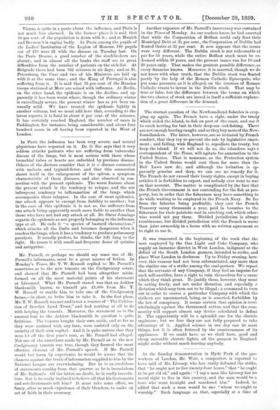Mr. Parnell, or perhaps we should say some one of
Mr. Parnell's informants, must be a great master of fiction. In Monday's Times, Mr. T. W. Russell replied to Mr. Parnell's assertions as to the new tenants on the Coolgreaney estate, and showed that Mr. Parnell had been altogether misin- formed on all the most material points of his statement at Liverpool. What Mr. Parnell stated was that an Arklow blacksmith known to himself got 21,000 from Mr. T. W. Russell to enable him to take one of the Coolgreaney farms,—in short, to bribe him to take it. In the first place, Mr. T. W. Russell was not and is not a trustee of " The Cultiva- tion of Derelict Land Trust," and had nothing at all to do with helping the tenants. Moreover, the statement as to the amount lent to the Arklow blacksmith in question is quite fictitious. The tenants bought their own cattle, and so far as they were assisted with any loan, were assisted only on the security of their own capital. And it is quite untrue that they were let off the first year's rent, as Mr. Parnell had alleged. Not one of the assertions made by Mr. Parnell as to the new Coolgreaney tenants was true, though they formed the most effective element of Mr. Parnell's speech. If Mr. Parnell would but learn by experience, he would be aware that the chances against the truth of information supplied to him by the National League are overwhelming. But he is as credulous of statements coming from that quarter as he is incredulous of Mr. Balfour's. Of the latter, no doubt, he is really incredu- lous. B at is he really inclined to believe all that his lieutenants and sub-lieutenants tell him ? It must take some effort, we fancy, after so much experience of their blenders, to make an act of faith in their accuracy.


































 Previous page
Previous page